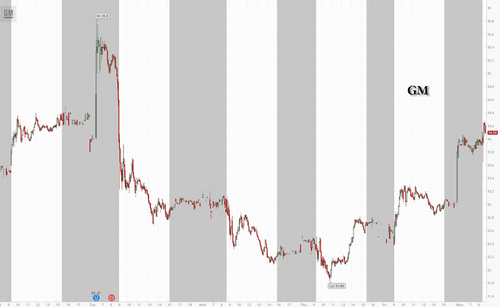General Motors Shares Pop 3% After Morgan Stanley Upgrade To Overweight, Raised Price Target

Image Source: Pixabay
Shares of General Motors are starting off the new month up more than 3% on Monday after auto analysts at Morgan Stanley upgraded the company to "overweight" from "equal weight." Morgan Stanley also raised its price target on GM from $35 per share to $38 per share, saying they believe the stock is oversold and that it offers an “attractive risk-reward skew with the well-tested $30 support level.”
Despite the beat on earnings -- as Morgan Stanley points out -- the stock is only back to levels it was at prior to earnings.
The bank said that sentiment on GM was currently too low as a result of EV names all pulling back -- but that GM should buck this trend:
"We note that first quarter results beat consensus expectations by 15 to 20% yet the stock has declined over 5% following the print. We believe the market is understandably focused on the recent price action in the electric vehicle market (by Tesla and other competitors), the auto/EV slowdown in China, continued uncertainty within the consumer lending market, and other macro economic uncertainties.
"However, this does not diminish the very strong performance during the first quarter including a nearly 11% EBIT adjusted margin in North America, which we estimate would be into the mid-teens % excluding EV expenditure and other inefficiencies."
"At our updated PT of $38, GM is trading at 6.6x 2023 EPS vs7.1x previously. We note that our PT is based on a normalized earnings analysis above, supported by DCF and SOTP. Our new earnings framework assumes 2030 EV penetration of 26%, supporting $153bn of ICE revenue at 8.7% margins," the bank wrote.
Morgan Stanley also updated its estimates on GM:
"Units: We now forecast GM's FY 23 vehicle deliveries at 6.3mn units total vs 6.5mn prior. Our FY24 estimate moves to 6.1mn vs. 6.2mn prior.
"Revenue: Our updated FY23 revenue estimate sits at $158.6bn vs $159.2bn prior. The reduction is largely driven by reduced lower auto units offset by increased avg. auto ATPs and slightly increased GMF revenue. Our FY24 estimate moves to $148.6bn vs $149.2bn prior on the same drivers.
"Auto EBIT: We increase our FY23 auto EBIT estimate to $11.5bn from $10.5bn. The increase is driven by an improvement in our view on new vehicle prices which are holding up better than expected, slightly offset by a decrease in our mix assumption. FY24 auto EBIT is now $9.9bn vs $9.3bn prior, driven by the same reasons.
"GM Financial: We tweak our GMF estimate, FY23 revenue now sits at $12.1bn vs $11.7bn prior. FY23 EBIT is slightly reduced however driven by building in increased negative effect from spreads and risk loss. For FY24 GMF revenue we now forecast $12.1bn vs $11.8bn prior and EBIT of $1.7bn vs $1.8bn prior."
The investment bank also pointed out the company's recent earnings report, which beat expectations, stating: “We expect a more gradual de-adoption of internal combustion in the US market versus expectations and a materially higher level of free cash flow conversion over the course of the internal combustion runoff vs. history due to lower investment burden and a more targeted/premium approach."
“We have increased belief that the forward capital allocation strategy (specifically the EV and EV investment strategies) will be approached with great discipline in a nimble and flexible fashion,” the bank added. The note continued:
"Our previous Equal-weight recommendation was partially driven by our concerns that GM would potentially launch too aggressively into high volume EV markets without fully developing its production and supply chain architecture. We have been concerned at the potential for large competitors to exert aggressive downward pressure on industry pricing faster than GM had planned for.
"If such a situation were to occur at a time when GM had already launched and scaled up its EV production, the results would have been detrimental to the earnings power of the company. However, we believe the company may be exercising a more gradual ramp strategy as well as a more nimble strategy to be able to tack higher or lower its EV offering based on 1) what the customer can afford;2) its ability to supply economically; and 3) broader conditions that affect supply and demand in the EV market (including competitive pricing actions)."
Morgan Stanley also put General Motors within the top 5 of 29 auto related stocks that it covers, Investing.com noted Monday morning, and praised the company's capital discipline:
"GM has taken a number of disciplined actions this year and demonstrated further cost cutting initiatives during the quarter. Following the first quarter we are increasingly convinced that GM is focused on capital discipline (potentially austerity, if needed) during an uncertain environment. GM CEO Mary Barra has a long track record of making tough decisions such as exiting the European and Korean (Daewoo) businesses, return of cash to shareholders, and a series of restructuring actions."
One may recall that GM was in the news when it announced it was halting production of the Chevrolet Bolt EV and Bolt EUV. This aligns with the GM's plan to transition the Bolt production line in Orion, Michigan into manufacturing electric trucks.
CEO Mary Barra confirmed the seven-year run of the Bolt would come to an end and be retooled for electric truck production last week: "We've progressed so far that it's now time to plan the end of Chevrolet Bolt EV and EUV production, which will happen at the end of the year."
In 2023, GM has three new EV models for mass-market across the Chevrolet brand, including the Silverado truck, Blazer, and Equinox. The new models might rekindle GM's EV growth strategy after the Bolt fizzle.
As we noted this week, Morgan Stanley has also said it sees a ‘great productivity race’ that will benefit some sectors but challenge others.
"Efforts in the US to re-, friend-, and near-shore critical industries have strong political support. But these initiatives narrow the geographical options for US multinationals, making cheap labor – particularly for skilled manufacturing – harder to find and exacerbating an underlying US economic challenge," the bank wrote.
"Similar historical conditions have pressed companies to focus on improving productivity through the development, diffusion, and integration of new technologies. We expect US companies to invest in infrastructure and new technologies, AI in particular, to boost productivity. Companies that rely on labor and lack substantial financial resources will likely be challenged by this dynamic."
More By This Author:
Europe Is Buying Record Amounts Of Refined Russian Fuels Through India, And Paying A Huge Markup
"We Are Not Optimistic": Top Sony Exec Doesn't See Smartphone Demand Recovery This Year
Escobar: De-Dollarization Kicks Into High Gear
Disclosure: Copyright ©2009-2023 ZeroHedge.com/ABC Media, LTD; All Rights Reserved. Zero Hedge is intended for Mature Audiences. Familiarize yourself with our legal and use policies ...
more




